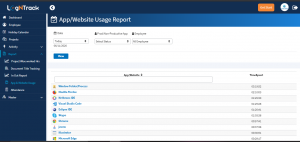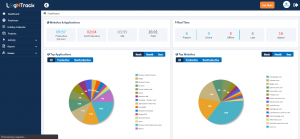How to Use Employee Monitoring Software for Productivity Analytics and Insights
As organizations today are working to adapt to a rapidly changing workforce and economic climate, it’s become more critical than ever to understand employee productivity. Business leaders understand that it’s not enough to measure how many hours a day are spent working; instead, it’s more important to understand how effective employees are at work that really matters. Fortunately, advancements in employee monitoring software are enabling leaders to do just that. By tracking and analyzing the right productivity analytics, managers can make data-driven decisions to help employees work smarter.
The employee engagement connection
Over the last decade, numerous studies have shown that there is a clear connection between employee engagement and productivity. When employees are disengaged, they are significantly less productive. According to research from Gallup, disengaged employees are at least 18% less productive and make their organizations 15% less profitable as a result. On the contrary, businesses with high levels of employee engagement report a 22% higher productivity level, and higher profits as a result.
This is yet another reason why organizations need comprehensive analytics tracking to measure productivity. Traditional HR surveys on engagement are typically done annually, and the data within are self-reported by employees. Advanced employee monitoring software like LogNTrack enables managers to get unbiased, ongoing productivity analytics that instead comes directly from user behavior. This enables managers to understand productive ways in which employees are working, performing, and collaborating on a regular basis, and pinpoints those that need improvement.
Understand how time is being spent
Use your employee monitoring tool to get broad visibility into how employee hours are actually allocated. Start by defining what productive and unproductive tasks or applications are for your different teams, then assign those productivity categories within your LogNTrack account. Assigning a category, such as productive or passive, to different tasks helps make your data analysis more efficient and objective for each individual employee.
In LogNTrack, you can then view the Productivity Report as a chart or for a single day to see a breakdown of how employee time is being spent across websites and applications you have categorized as being productive, unproductive, or passive.

This helps managers identify employees who are struggling to focus on the right activities during the workday so that they can offer support.
Look for workflow inefficiencies in application usage
Although these categories are helpful, there’s still no replacement for human insight. You should still look out for excessive usage of any websites or applications, as this can be a sign of burnout or confusion around responsibilities. For example, you might assign Slack as a productive application, but an employee spending the majority of their workday in Slack is not ideal.
In LogNTrack, you can use the Top Websites and Top Applications reports to find these inefficiencies. A common challenge to look out for is time spent on email, which can be a big source of distraction for many employees. According to research from Adobe, the average employee spends 4.1 hours per day checking their email. Identifying patterns like excessive email usage gives managers the opportunity to create more efficient workflows, tools, or guidelines for teams or individual employees to achieve higher productivity levels.
Uncover coaching opportunities for employees
Most employees want to be productive, but lack the visibility, skills, or support to optimize their productivity at work. By using productivity analytics in a transparent way with employees, managers can use this data to educate or guide employees towards more productive patterns.
Examples include:
- Excessive social media usage is most often a sign of a disengaged employee. This could be due to personal factors outside of work, communication issues with coworkers, or even be a sign that their interests and skillsets are misaligned with their roles (unless their roles include social media management, of course).
- Inconsistent or extended working hours can mean that the employee is overworked and at risk for burnout. This could even reveal a workforce capacity issue and mean that the team needs to add a new role.
- Unusually long hours spent on core tasks is an opportunity to provide training or education to the employee. For example, if productivity analytics show that an employee is allocating time to productive tasks, but those tasks take longer to complete than other employees with similar roles, there is likely a skills gap that needs to be addressed with additional training.
- Unexpected time spent on manual processes is an indicator that your operational efficiency needs improvement. If your team is spending time on tasks that could be automated, you have likely uncovered an opportunity for cost-saving automation and operational improvements. This data could also prove useful in helping to make a business case for a new tool purchase.
- Excessive social media usage is most often a sign of a disengaged employee. This could be due to personal factors outside of work, communication issues with coworkers, or even be a sign that their interests and skillsets are misaligned with their roles(unless their roles include social media management, of course).
- Inconsistent or extended working hours can mean that the employee is overworked and at risk for burnout. This could even reveal a workforce capacity issue and mean that the team needs to add a new role.
- Unusually long hours spent on core tasks is an opportunity to provide training or education to the employee. For example, if productivity analytics show that an employee is allocating time to productive tasks, but those tasks take longer to complete than other employees with similar roles, there is likely a skills gap that needs to be addressed with additional training.
- Unexpected time spent on manual processes is an indicator that your operational efficiency needs improvement. If your team is spending time on tasks that could be automated, you have likely uncovered an opportunity for cost-saving automation and operational improvements. This data could also prove useful in helping to make a business case for a new tool purchase.
Get a snapshot of team productivity
Want to just get a quick read on your team’s productivity throughout the day? With LogNTrack's Team Pulse productivity dashboard, you can see real-time productivity metrics for individual employees or your entire team at-a-glance. This provides managers with immediate visibility into common work tools used throughout the day, average working hours across teams, and top-performing employees who deserve recognition.

Employee productivity benefits everyone
In today’s workforce, it’s never been more important to focus on employee productivity. Remote work and economic uncertainty can add to employee stress and poor productivity means longer working hours and unnecessary frustration for employees and employers alike. By reviewing insights from employee activity, managers will gain a better understanding of how employees are working, identify areas for improvement, and intervene when work habits are off track. Ultimately, improving employee productivity by leveraging objective workforce analytics is a win for everyone.
Get FREE employee productivity insights with LogNTrack
Get visibility into your workforce’s productivity today by creating a FREE LogNTrack account (no credit card required).
Already have a LogNTrack account? Check out our Data Connect tool to integrate your user behavior data with other business data sources for even deeper, tailored, workforce productivity analysis, and reporting.
About LogNTrack
LogNTrack is a workforce productivity and analytics software company that helps teams understand how people work, whether in-office or remote. Our cloud-based user activity monitoring platform collects and analyzes data and provides insights to help organizations be more productive and compliant. With more than 7,500 customers and over 100,000 users of its free version, LogNTrack's award-winning solution can be configured in minutes to identify operational bottlenecks, flag operational compliance risks, and provide valuable insights that help employees and employers improve productivity outcomes.
Utilizing advanced Employee Monitoring Software like LogNTrack for ongoing productivity analytics bridges the gap between employee engagement and productivity, enabling data-driven strategies for organizational success.
ReplyDelete